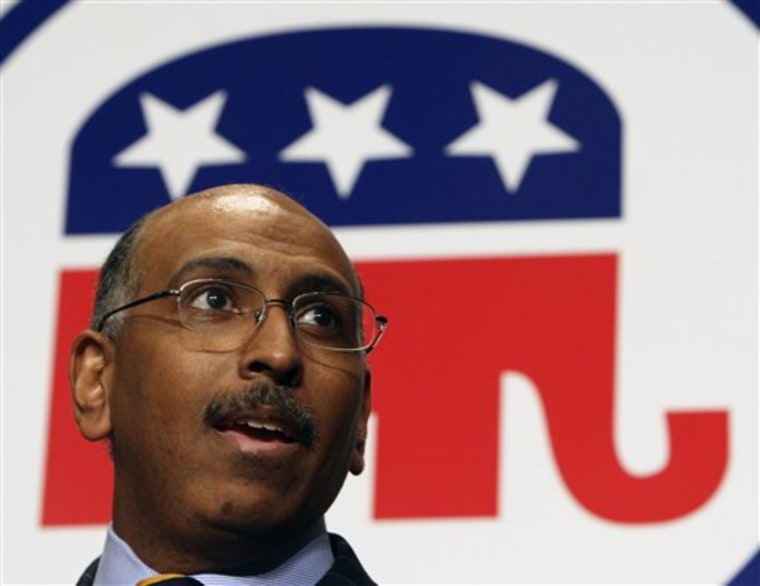Brash and ready to brawl, Republican Party Chairman Michael Steele stands as a lightning rod for critics and television comedians. He is being supported, however, by the party's leaders in the various states and by local activists still reeling from crushing electoral losses on President George W. Bush's watch.
"His election has been overwhelmingly received by the rank-and-file Republicans," said Colorado party chief Dick Wadhams. "They see him as an articulate party leader who can go toe-to-toe with the Democrats, and they don't share the perception that some in the confines of Washington have."
Steele's situation echoes that of Howard Dean, the former Vermont governor, presidential candidate and outsider who in 2005 was elected Democratic chairman much to the chagrin of the party establishment. Dean later was vindicated when his 50-state organizational strategy was credited with helping Sen. Barack Obama reach the White House.
Three months after the nation elected its first black president, Republicans chose their first black chairman in Steele, a former Maryland lieutenant governor. He promised an overhaul of the party, just as Dean did with the Democrats after a series of losses.
In the nearly six weeks since Steele's election, his organizational shake-up, off-the-cuff style and criticism of fellow Republicans have conflicted with his predecessors' buttoned-down Washington approach. The contrast is so wide that the capital's party insiders privately call Steele an embarrassment and fret about the organization's fundraising, recruiting and communications strategy.
At least one member of the Republican National Committee, longtime Steele opponent Ada Fisher, has demanded his resignation, while Steele's presence on the talk-show circuit and his eyebrow-raising commentary has made him a punch line on late-night comedy shows and earned him a spoof on late-night comedy sketch show "Saturday Night Live."
Sounding more like his former brother-in-law, retired former heavyweight champion boxer Mike Tyson, Steele has drawn ridicule for using street phrases like "bling, bling" for flashy jewelry.
Steele's support
Yet, interviews with more than a dozen Republican loyalists across the country, many of whom initially voted for Steele's opponents in the party's multiballot January election, indicate that the party's hard-core supporters are more than willing to give their new leader the benefit of the doubt. They are standing behind Steele, at least for now, as he charts a new course for a Republican Party that just three years ago controlled both the White House and Congress, but now finds itself out of power.
"There's a transition period. Every new executive is going to have their own style, their own set of strengths and weaknesses, and they deserve time to get a feel for the organization and to imprint their own image upon it," said Fergus Cullen, a former New Hampshire party chairman.
Steele's challenge: To turn a party that carried water for the Bush administration for eight years into a loyal opposition, able to go up against Obama while preparing for next year's congressional elections and the presidential race in 2012.
The smooth-talking, media-loving Steele has acknowledged missteps in his first weeks. Yet, the 50-year-old has attributed them to a personal style intended to get a rise out of people and an effort to revamp Republican headquarters.
Shortly after winning, he fired much of the staff and embarked on what his advisers call a top-to-bottom overhaul of operations they say are woefully outdated. Critics gripe he got rid of people with institutional knowledge. But state party leaders challenged the notion that vacant positions at the hulking Capitol Hill headquarters could hurt the party's prospects in coming elections.
"It's a huge operation. It's like any new CEO who comes into a company and assesses it," Chris Healy, Connecticut's party chief, said. He chalked up the criticism to "internal Beltway navel-gazing" that "will be all but forgotten in another week."
"Beltway" refers to the highway around Washington and is a derisive term used by Americans to describe how out of touch capital power brokers are.
Healy added: "I have every confidence he will do well. We're headed in the right direction."
Outside the Beltway
State Republican activists also dismissed hubbub in Washington over Steele's slang-tinged vernacular and his shoot-from-the-hip comments. In a stream of radio, TV and print interviews, Steele promised to give the party a "hip-hop makeover" that would be "off the hook" and would attract even "one-armed midgets."
"He's trying to shake it up a little bit. I see no objection to him. I like his approach," said Jerry Roe, a former party executive director in the state of Michigan. "This party's going to have to make some major changes to come back, and that's what he's trying to do" both in style and in substance.
Washington outsiders also brushed aside Steele's criticism of fellow Republicans.
The chairman raised the prospect of primary challenges for moderate senators from the Northeast who sided with Democrats on Obama's economic stimulus plan. Steele also compared Republicans to alcoholics on a 12-step program and called Rush Limbaugh, a boisterous, opinionated radio political commentator, "incendiary and ugly. He then apologized to the conservative radio personality to the delight of Democrats.
"We don't have the presidency, so we need an outspoken, visible party chair. We can have family squabbles. I don't have a problem with that," said Mark Fahleson, Nebraska's Republican chairman. "There's been a lack of internal debate with the past eight years, so I think this is healthy."
Overall, there is a sense in states that Steele seems to be exactly the change agent the party needs after eight years of taking their marching orders from Bush and his political guru, Karl Rove, and following the 2006 and 2008 electoral disasters.
Given that record, "there's probably a mix of hope and optimism that a fresh face and somebody of African-American descent will be a good thing," said Chuck Hurley, head of the Iowa Family Policy Center and a delegate to the Republican presidential nominating convention last year.
Still, he added: "It's kind of a wait-and-see attitude with most people."
